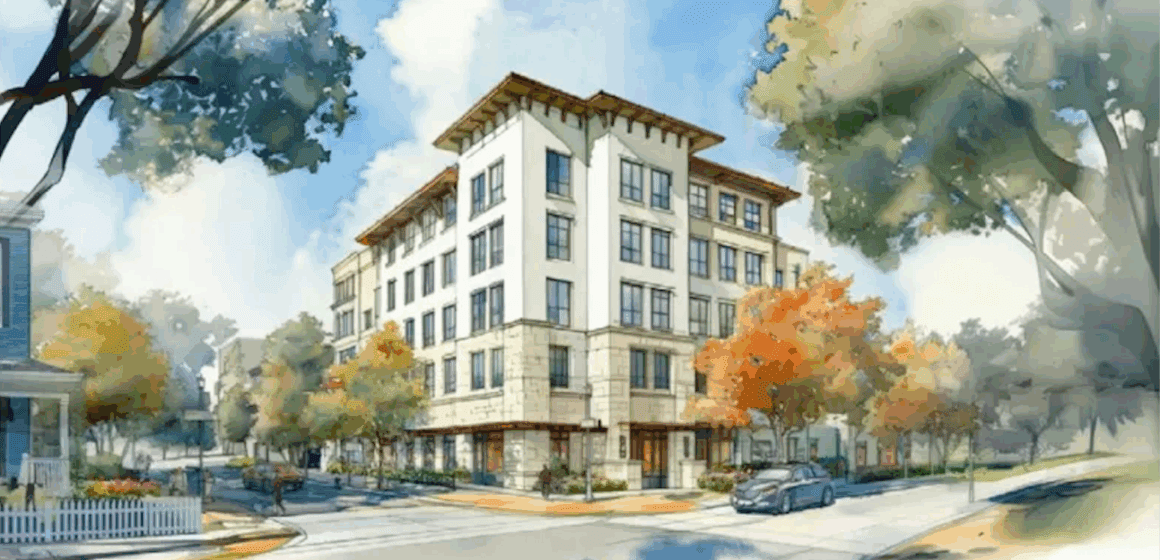For a body historically known for paring down housing development proposals, the Palo Alto City Council this week overwhelmingly put its support behind a proposal for 72 affordable housing units on a downtown surface parking lot, an increase of 18 compared to the initial design that it had endorsed in January.
The original plans from January proposed a C-shaped, five-story building with 54 units on Lot T, at the corner of Lytton Avenue and Kipling Street, according to a city staff report. All of those units would be affordable, and a little more than half would be for families. But Alta Housing presented two six-story options for review on Wednesday, and the council indicated a clear preference for the 72-unit version at the special meeting.
“I never look at a housing project and say, ‘Just get the one with the most units,’ because we have to have the right kind of living situation,” Mayor Ed Lauing said. “But this does, and it gets the most units.”
Alta Housing also preferred that option, CEO Randy Tsuda told the council. That’s because the other six-story alternative would incorporate studio units that are harder to fill and not significantly more affordable for tenants than one-bedroom apartments, he said.
“We do find that the units that tend to take the longest to rent are studios,” he said. “People tend to choose more space if they have the option.”
The proposal preferred by both council and Alta Housing would include 33 one-bedroom units, 20 two-bedroom units and 19 three-bedroom units. Like the original proposal, the courtyard would face inward, prompting concerns from council members about building mass on the side of the building facing Kipling Street that is already home to many historic single-family residences and small-scale businesses.
Councilmember Greer Stone suggested that the developer explore options like step-backs on the higher floors to reduce building mass, a proposal that other council members agreed with.
Another primary concern is the funding for the project, or lack thereof. The city is on the hook for $76,000 per unit, and increasing the number of units for the project would raise the total cost to the city from $4.1 million to $5.5 million.
Even after the city’s contribution, state tax credits and loans, the gap in funding stretches to about $2.2 million. It remains unclear how the developer and the city plan to fill the gap.
The city also has to contend with a lawsuit from Downtown Vibrancy, a group of property owners who claim that Palo Alto illegally entered a partnership with Alta Housing to develop Lot T. The group argues that because downtown parking facilities were funded through assessments from property owners, the city doesn’t have the right to unilaterally repurpose lots and garages for other uses.
The city rejected that argument.
In a reply filed Sept. 17, the city wrote that Downtown Vibrancy’s suit intends “to delay or thwart the Project.” Alta Housing also estimated that the delay from the suit could cost at least $2.75 million per year because of increasing construction costs. The delay could be significant enough to make the project financially infeasible for the city, attorneys for the city maintained in court documents.
Palo Alto requested that Downtown Vibrancy post a $500,000 bond to offset some of the costs that the lawsuit would impose on the project. But in a victory for Downtown Vibrancy, a judge denied that request earlier this month because the bond would impose an “undue economic hardship” on the property owners. Judge Theodore Zayner also concluded that the city failed to adequately address all the claims from Downtown Vibrancy about the project, and thus failed to prove that the lawsuit is “without merit.”
While the litigation creates a hurdle for the project, city officials are still hoping to move ahead with the development. The council is also hoping to replace the parking spots that would be lost on Lot T by building a new garage on the corner of Hamilton Avenue and Waverley Street.
“The pending litigation makes timing for the Lot T project and future projects difficult to predict. However, in the absence of litigation, construction could commence as soon as 2028,” the city wrote in a Medium post on Oct. 21.
In addition to the city council meeting on Wednesday, Alta Housing will solicit feedback from the public about the different unit options at a community meeting later this year, which will also be incorporated into the formal development application.
This story originally appeared in Palo Alto Weekly. Riley Cooke is a reporter at Palo Alto Weekly and Palo Alto Online focusing on city government.



Leave a Reply
You must be logged in to post a comment.